Big Red Book
Celebrating television's This Is Your Life
Eamonn ANDREWS (1922-1987)
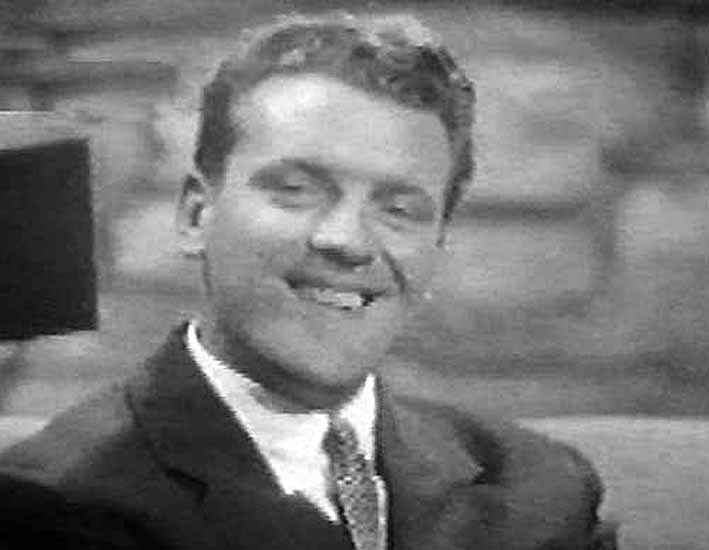
- The first edition of This Is Your Life on British television
THIS IS YOUR LIFE - Eamonn Andrews, radio and television presenter, was surprised by Ralph Edwards - the creator and host of the American version of This Is Your Life - in the audience at the BBC Television Theatre.
Born and raised in Dublin, Eamonn began his broadcasting career with the Irish state broadcaster Radio Éireann in 1946. Having moved to London in 1950 to join the BBC, he made a name for himself with his sporting commentaries. However, he soon became one of the corporation's most popular presenters, hosting such programmes as the radio comedy quiz show Ignorance Is Bliss and the television panel game show What's My Line?.
In 1955, the BBC announced that the successful American television programme This Is Your Life would be coming to British screens, with Eamonn as the presenter. Unfortunately, the original choice for the subject of the first edition, the footballer Stanley Matthews, had to be cancelled following a press leak. The producers told Eamonn that the replacement subject would be his friend, the boxer Freddie Mills, but they had other plans...
Eamonn Andrews was a subject of This Is Your Life on two occasions - surprised again by David Nixon in May 1974 at Thames Television's Teddington Studios.
"This Is Your... Oh blimey!"
programme details...
- Edition No: 1
- Subject No: 1
- Broadcast live: Fri 29 Jul 1955
- Broadcast time: 7.45-8.15pm
- Repeated: Sun 1 Sep 1991 6.00pm
- Venue: BBC Television Theatre
- Series: 1
- Edition: 1
on the guest list...
- Gladys Hay
- Margaret - mother
- Peggy - sister
- Kathleen - sister
- Noel - brother
- Treasa - sister
- John Callaghan
- Jack MacGowran
- Patrick Fitzgerald
- Grainne - wife
- Don Cockell
production team...
- Researchers: Peter Moore, Nigel Ward
- Writer: Gale Pedrick
- Director: unknown
- Producer: T Leslie Jackson
second tribute
surprised again!
a brief biography
a review of the first series
tributes to the original presenter
first-hand recollections
the genesis of the programme
the programme's relaunch
the producers who steered the programme's success
the show's fifty year history
the man who created it all
a career review
the applause, laughter and tears
Radio Times previews the first edition
Radio Times previews the second edition
What A Surprise For Eamonn Andrews
Press reviews of the programme's first edition
This Is Your Life: The Show that can never be fully rehearsed
TV Mirror goes behind-the-scenes of the first series
Interview with the first producer of This Is Your Life
Secrets Of 'Life': The ones who got away
Producer Malcolm Morris exposes some production secrets to TV Times
BBC harks back to a previous life
The Guardian reports on the return to the BBC
The Daily Mail profiles the programme's history
Biggest night of all for the big red book
Press coverage for The Night of 1000 Lives
This Is Your Life Set For TV Comeback
Press coverage of the programme's relaunch
Stanley Matthews should have been on the first This Is Your Life
Look and Learn magazine feature
TV Times celebrates This Is Your Life
An extract from the UK's first This Is Your Life with the show's creator, Ralph Edwards, surprising the show's future host, Eamonn Andrews
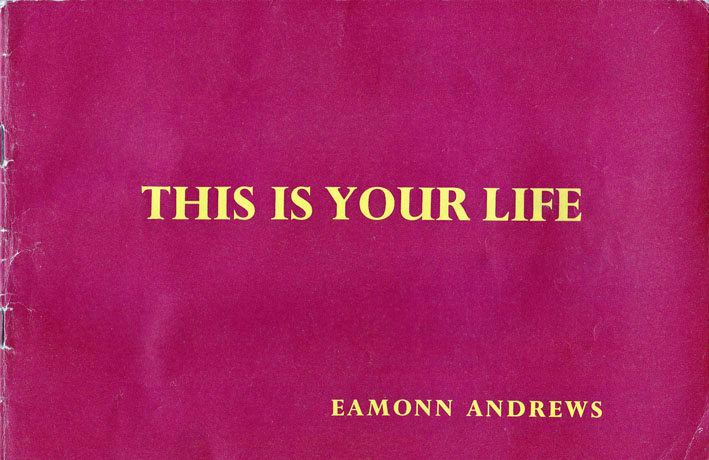
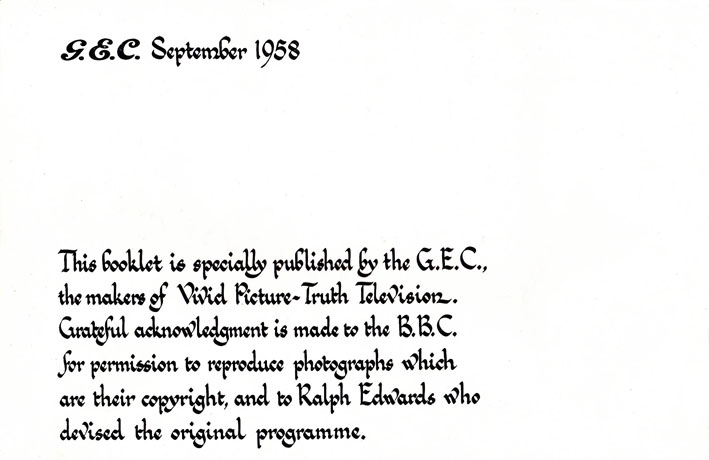
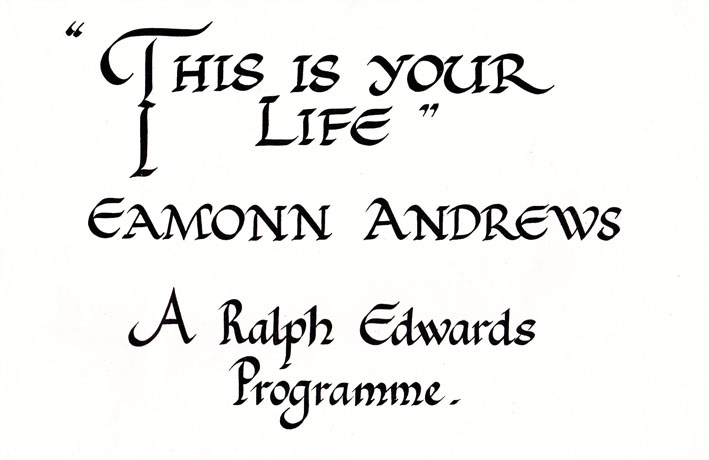
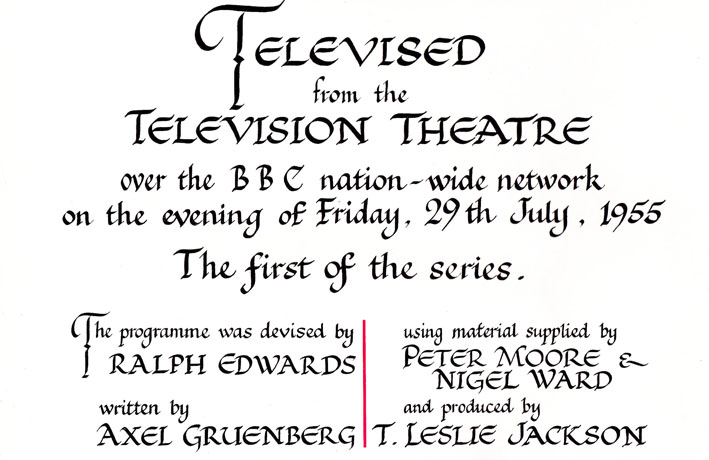
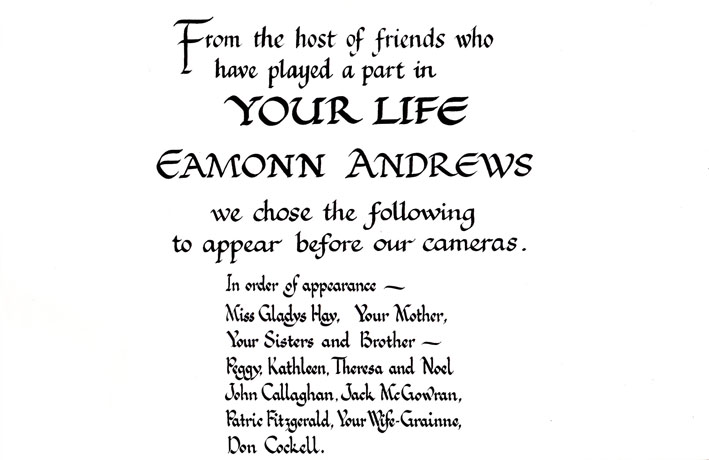
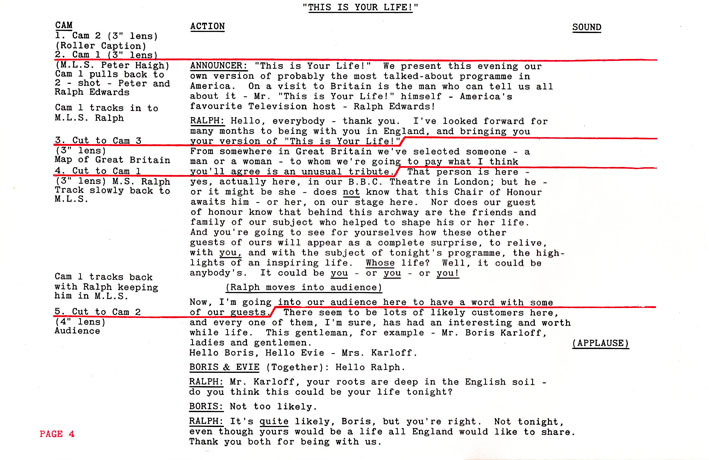
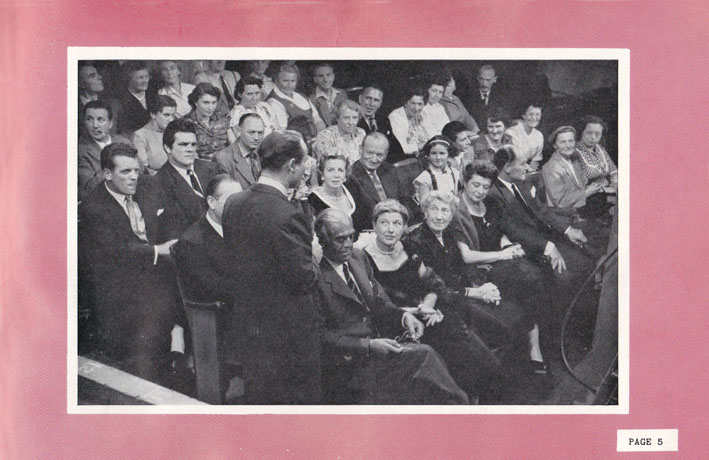
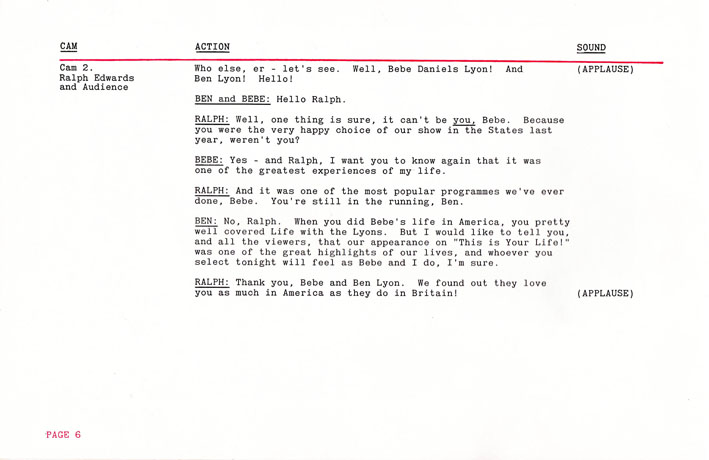
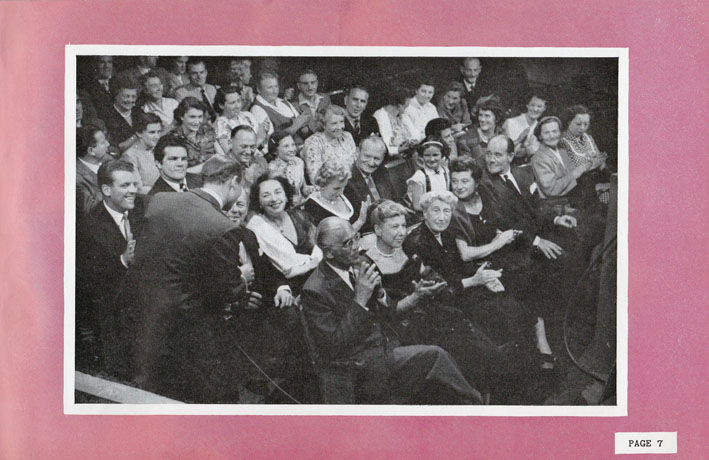
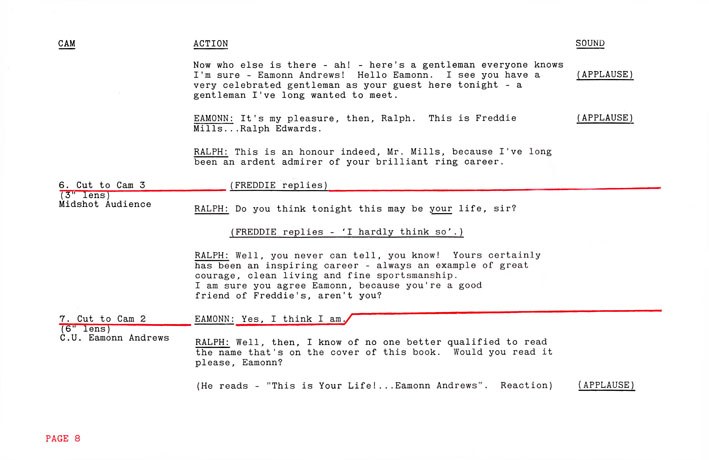
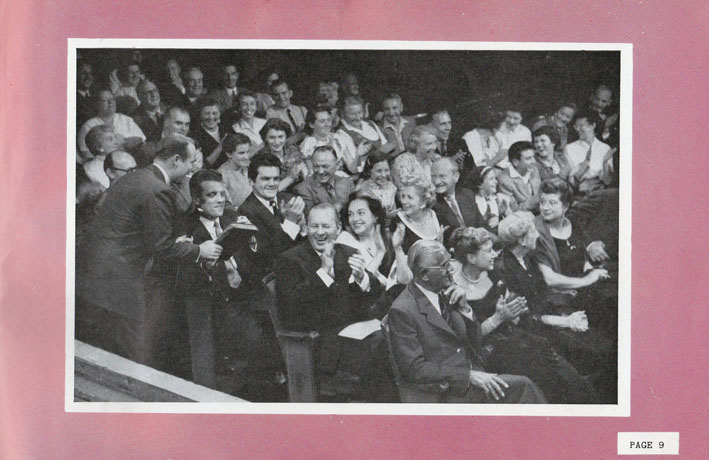
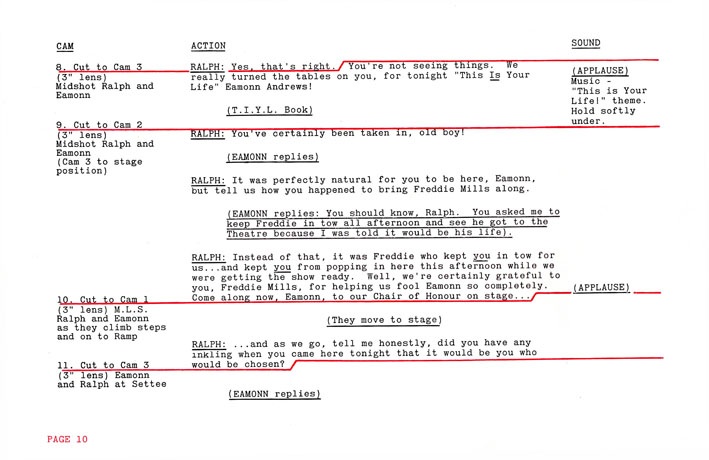
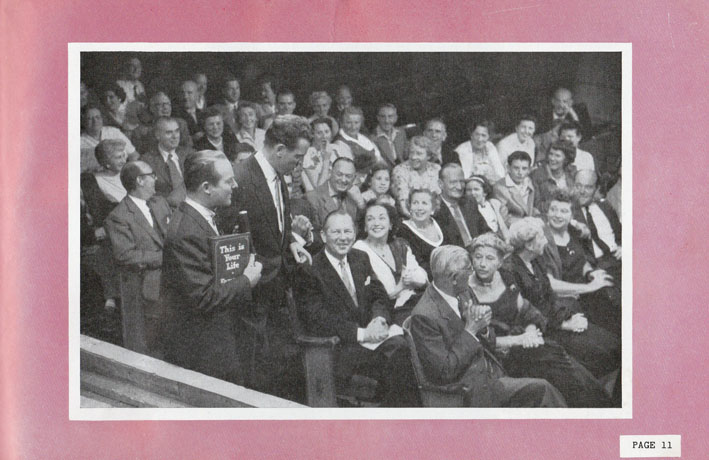
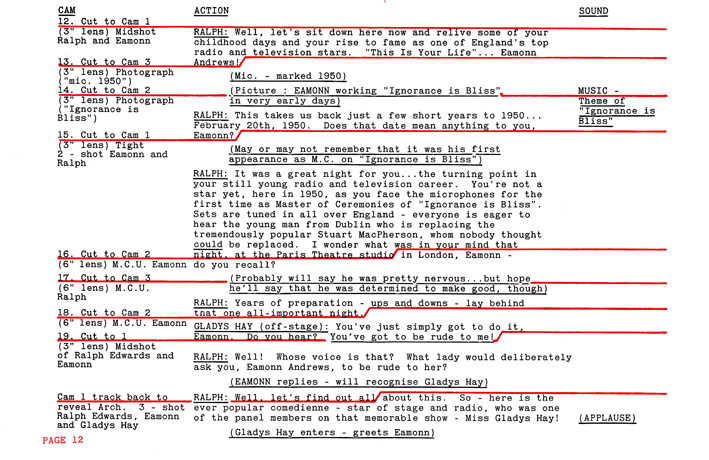
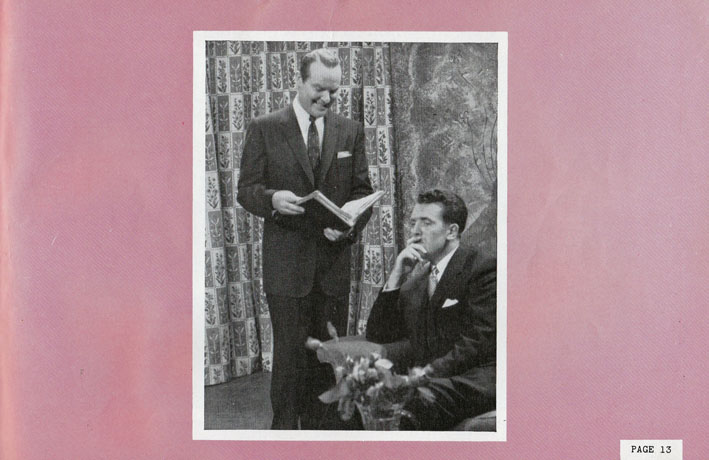
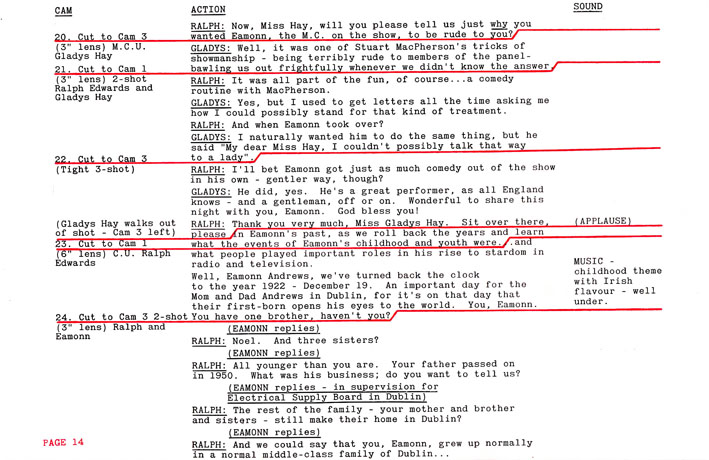
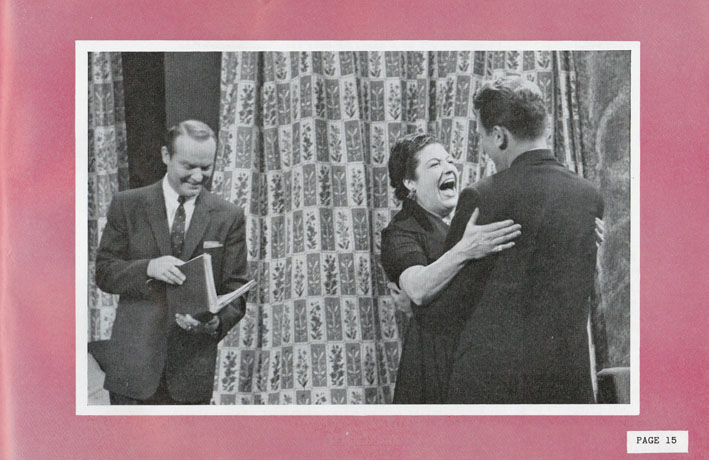
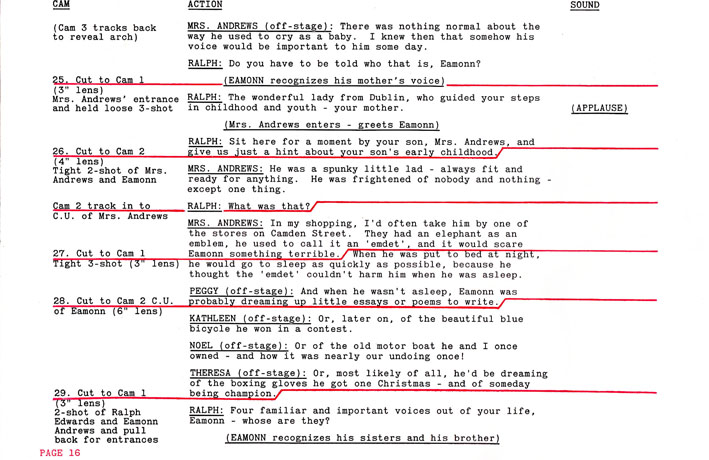
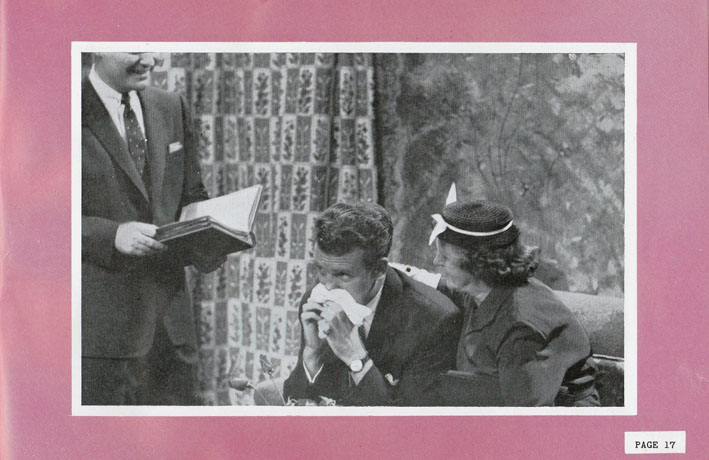
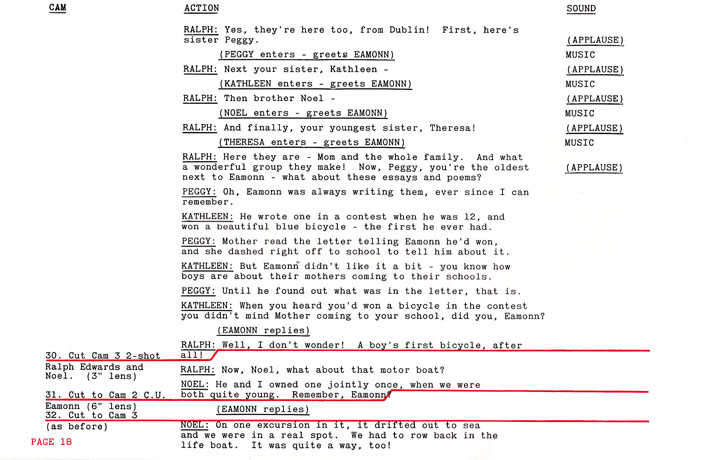
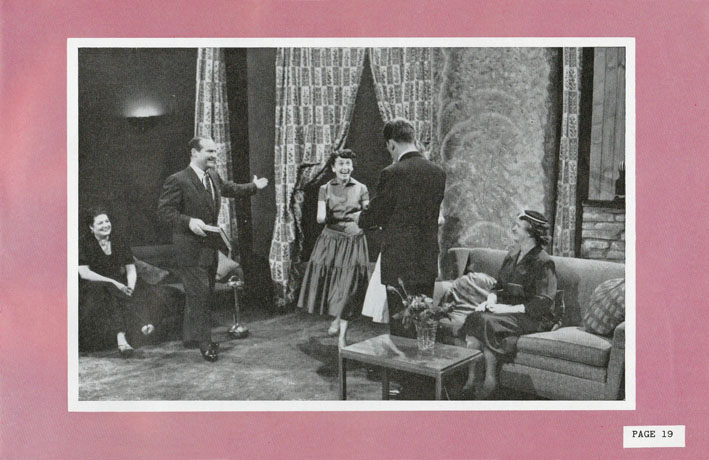
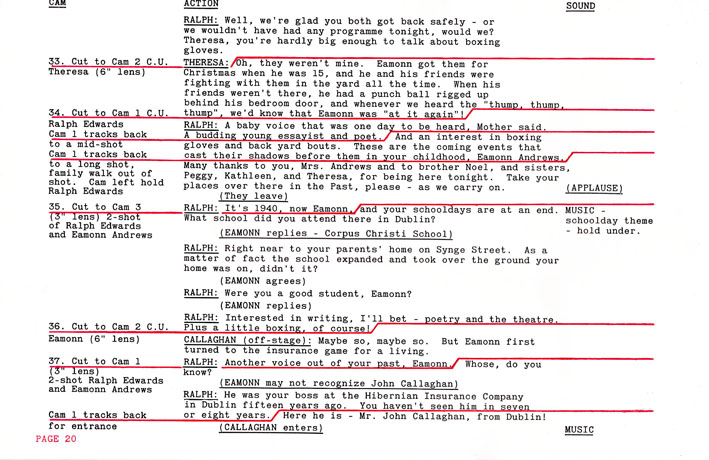
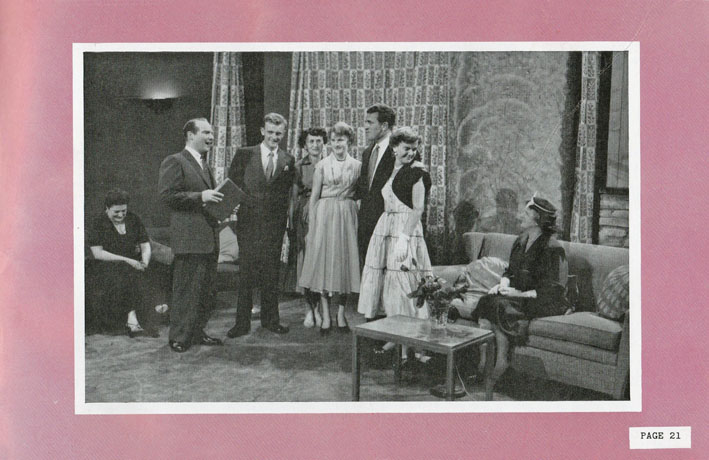
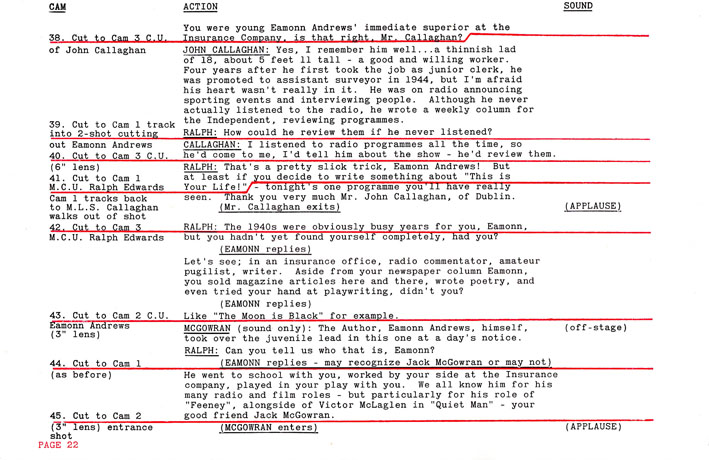
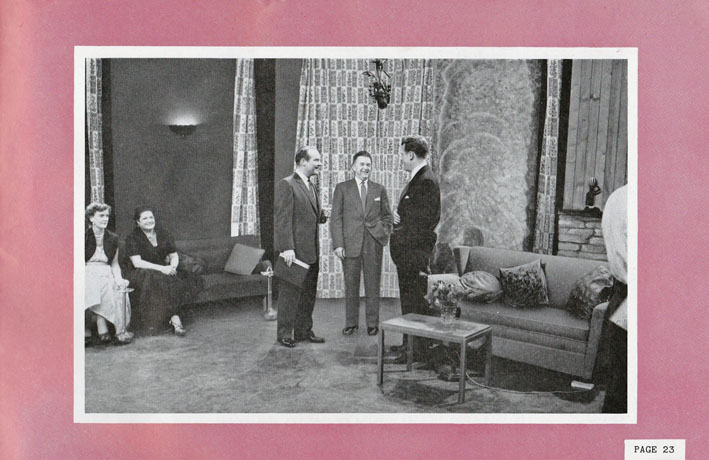
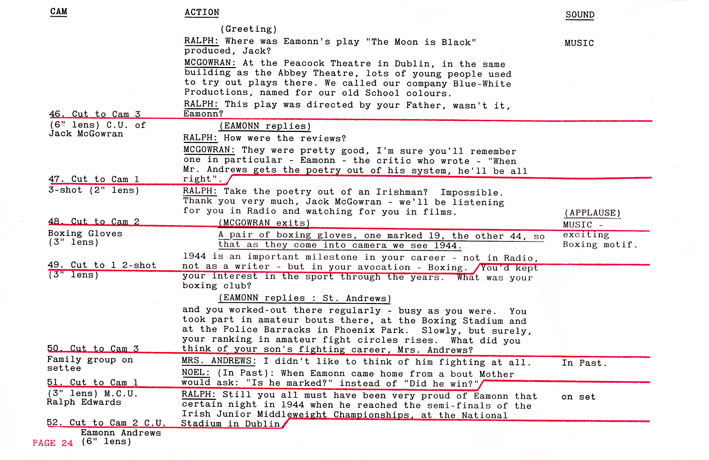
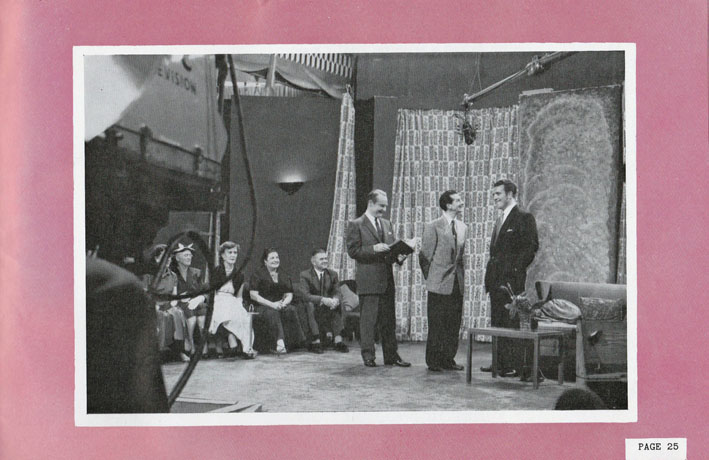
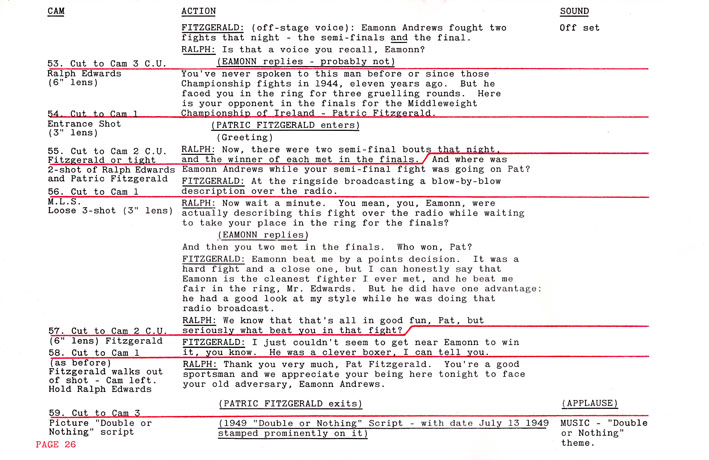
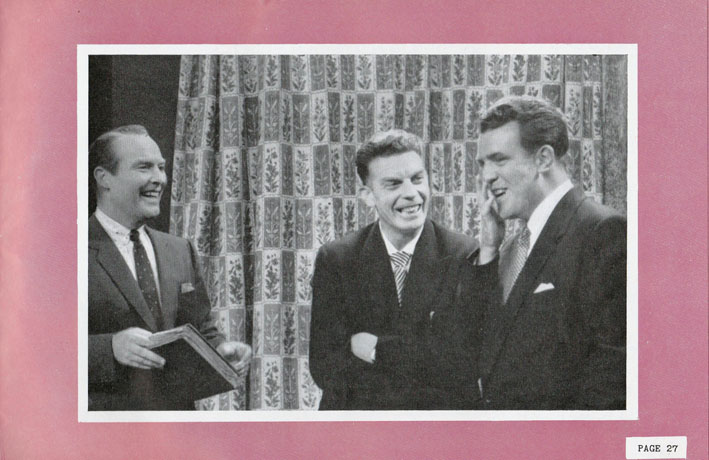
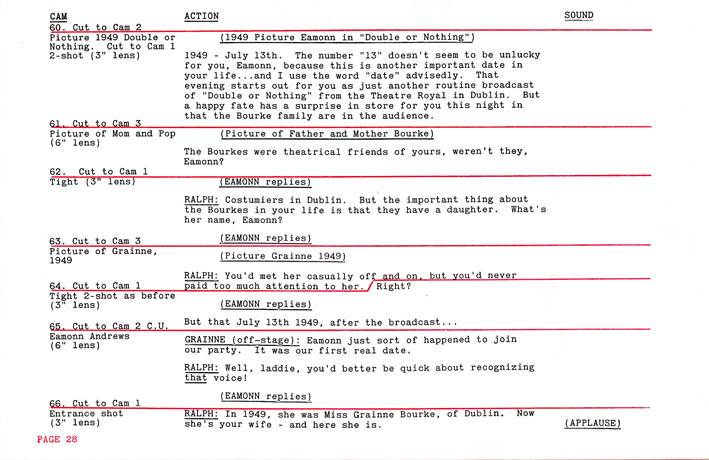
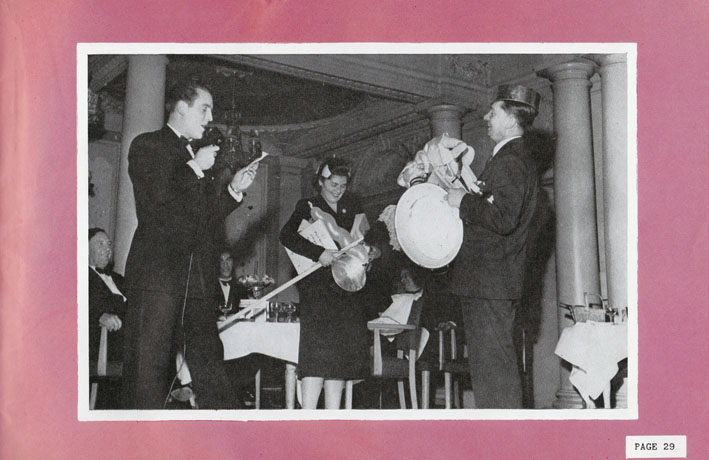
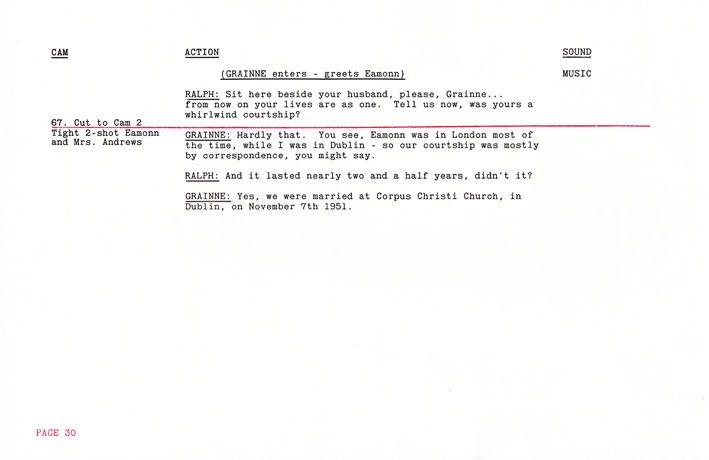
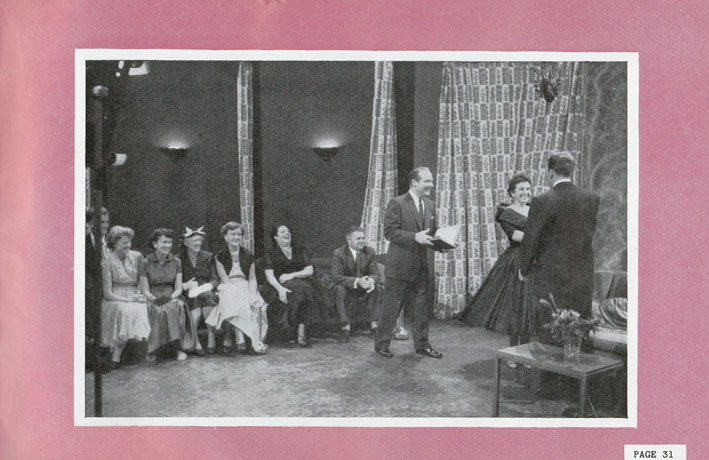
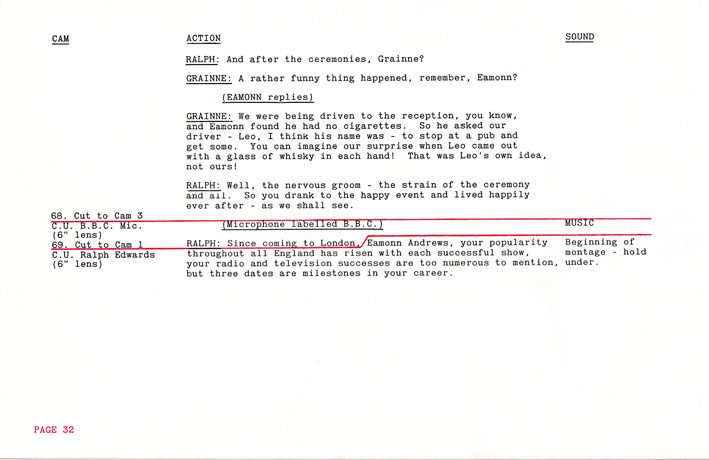
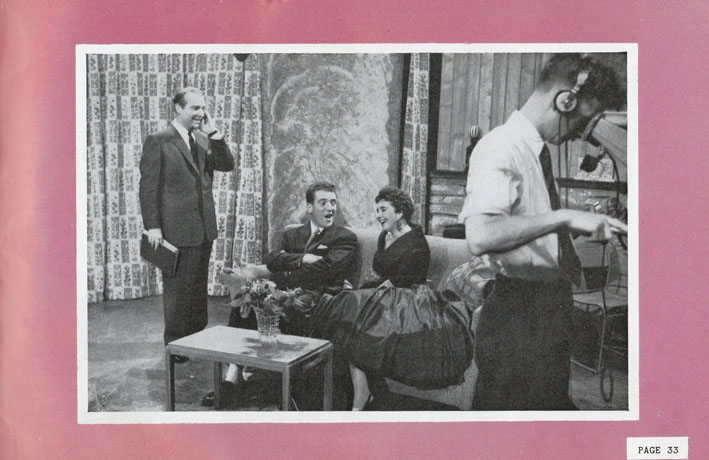
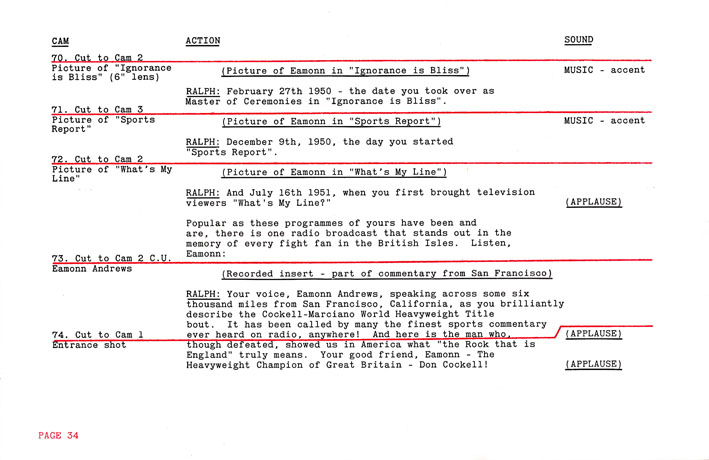
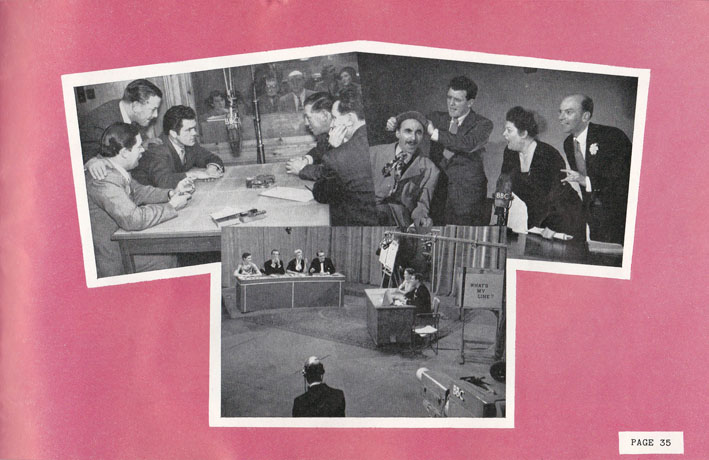
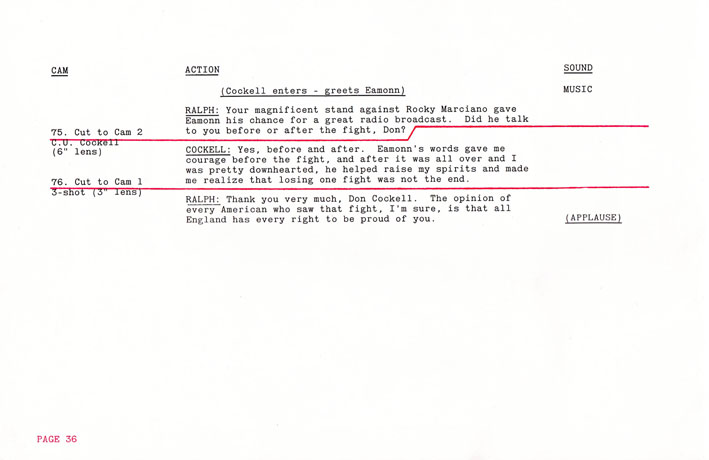
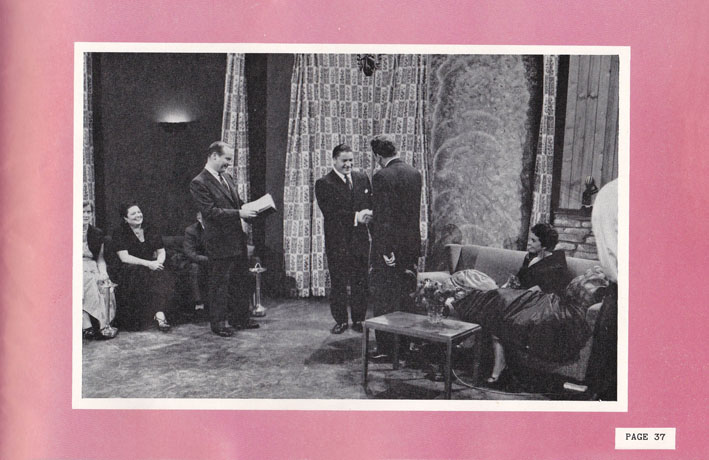
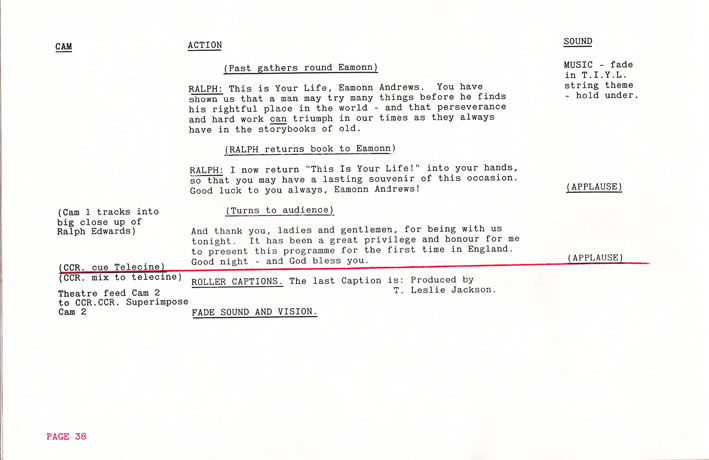
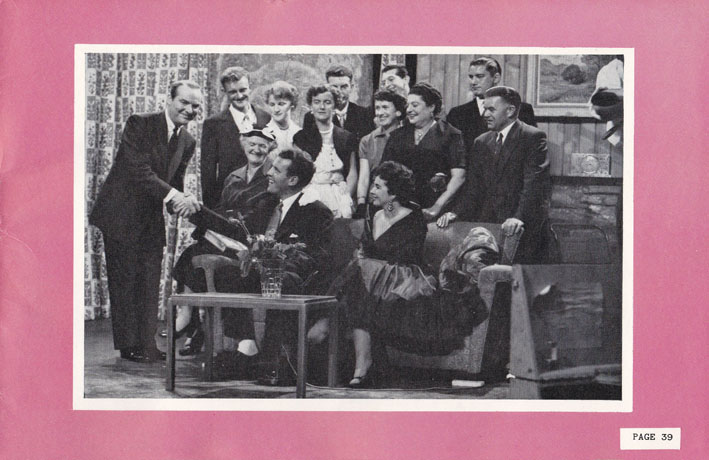
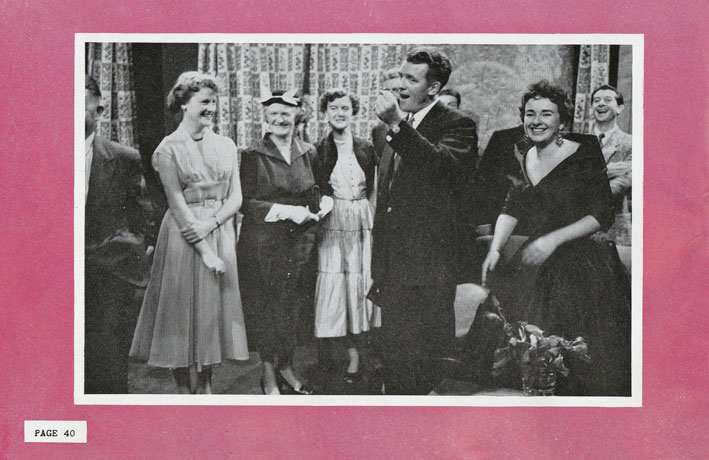
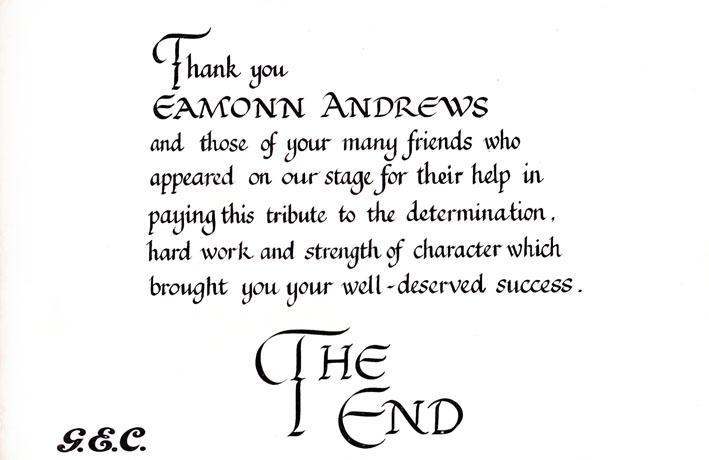
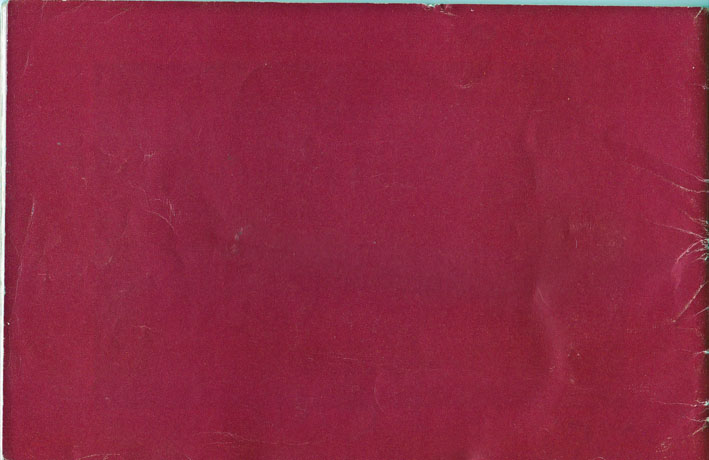
Photographs of Eamonn Andrews This Is Your Life. In September 1958, the General Electric Company employed Eamonn to advertise their new television sets. The company produced a souvenir booklet of the first edition of This Is Your Life to tie in with the promotion. The booklet contains photographs from the broadcast, along with a shooting script
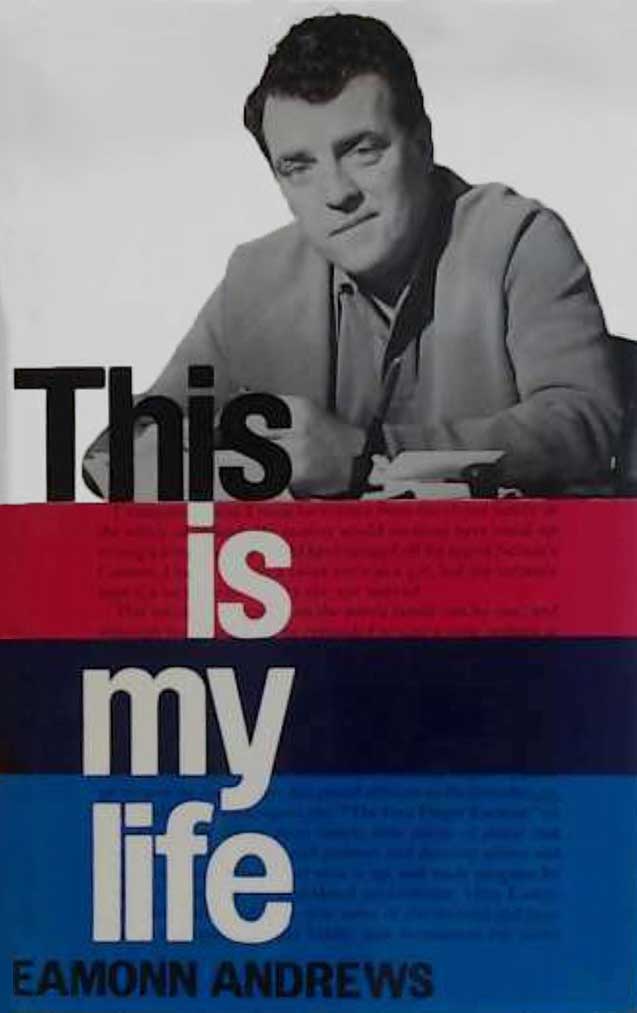
Early on I decided that as soon as I had enough money I'd go to the USA, and go as often as I could to see what I could learn from a country that was producing more television than anywhere else in the world. Before I went there in the summer of 1955, BBC Light Entertainment Chief Ronnie Waldman said: "There's a programme out there called This Is Your Life – take a look at it. I'd be interested to know what you think."
Well I had a look at it, saw an American named Ralph Edwards presenting it, and my first reaction was: This is Television. I immediately cabled Waldman saying I thought it was a great programme, and one that I would very much like to do. Certain changes would have to be made, but I was convinced the show could be a great success in England too.
Several telerecordings of the US version were made available for the BBC where, in high places, there were doubts about the programme. It wasn't "A BBC type programme". But I think the story that did most to win them over was a tremendous This Is Your Life on the late film actor, Victor McLaglen. It was a bouncy, rumbustious, tearstained show with old Victor, his face looking as if it had been made from old car tyres, being greeted by his seven huge brothers thumping in from all parts of the world.
The decision was that they would try the programme at first on a monthly basis. This sounded fine to me, but I've since realised that in effect a monthly show is one which gives the planners a chance to get out from under it very fast, if they want to. It can be made to vanish from the schedules almost without a whimper.
I had no qualms at all about the aspects that were later to be criticised so severely in the Press. This because I never subscribed to the view that the traditional British stiff upper lip is quite as stiff as it is made out to be. I don't believe that the average Englishman is as unemotional as the propagandists would have us think. He is just as interested as anyone else in warm, human situations. Maybe a Latin or a Frenchman or even an American can bring a blush to his cheeks by over-playing the compliment of ransacking the bag of adjectives. But at heart an Englishman, just as badly, wants to tell the wife how much he loves her, or the girl-friend how heart-stopping he finds her new dress. But the Englishman has been the victim of centuries of sustained conspiratorial brain-washing. He's been made to believe that not only has he got a stiff upper lip but that not having it would be shameful. A massive, subliminal campaign that helped build empires, increase trade, and reduce the birthrate.
Not for one minute do I think Ronnie Waldman was thinking along these lines when he got the green light for This Is Your Life. But get it he did. The first programme was to be put on by the original American production team. Ralph Edwards came over with his director, Axel Gruenberg, a great, gentle ox of a man wearing thick glasses. Like Ralph, Axel was practically born in radio and TV.
Introductions over, Gruenberg began to tell us about some of the "Lives" they had done in the States.
"Gee we had a wunnerful about Mrs...." he started. As he got into the story, his voice gradually began to grow husky and finally the tears were trickling down his cheeks. I thought I was imagining things. Later I was told that I must see him in the control box directing a programme. It seemed that frequently towards the end of a moving show his eyes would grow moist, his glasses get steamed up, and he would sit at the panel almost choking as he called the camera shots. I never did see him in action, but I have endearing memories of him reaching for his handkerchief as he became aware of his own story-telling about to overcome him once again. Dear old Ax. A delightful sentimentalist. He was like a teddy-bear version of Gilbert Harding.
At the time I was writing a weekly column in the late lamented London evening paper, The Star. It was obvious that there would be good copy in this new television show, with its air of secrecy and mystery. To discuss the first programme which was to be compered by Ralph, a meeting had been arranged, and it happened to be on the day my column was due. So I wrote a piece beginning "...this morning I met Ralph Edwards..." - the meeting hadn't taken place when that was written but would have by the time it was read.
Now the first subject of the programme was to be the greatest footballer of them all – Stanley Matthews. The research was done, the script prepared, and the count-down beginning when the whole thing exploded in our faces. A journalist got hold of our secret and ran the story in the Daily Sketch, naming Matthews.
We sat around in Ralph's hotel apartment – Ralph, Axel Gruenberg, Leslie Jackson (Jacko), who was to be the BBC's producer, myself and one or two others. I don't know how the rest felt but I was numb. There was little more than a week before transmission.
This sort of thing had happened once in America to Edwards, but he had managed to stave off the disaster by cordoning off as it were the unsuspecting subject from the offending newspaper. What people sometimes forget is that the only person we are concerned about surprising is the subject. As long as he or she is unaware of the intention, we don't really mind who else knows. But, of course, the more they know, the greater the risk.
Ralph Edwards, holding the paper in his hand, said: "Where is Matthews?"
"He's away fishing," someone answered.
"Well, can't we get a ring around him to stop newspapers getting to him?" Ralph suggested.
But the problem was easier in America, where newspapers are local rather than national. When it was explained, Edwards realised that it was inevitable that the news would leak through to the soccer maestro.
"OK then we'll have to cancel," Ralph said, and the gloom deepened. There were no reserves ready. At the same time I became very conscious that my piece in The Star would be all nonsense now that the secret was out; and the chances of having a programme were diminishing by the second.
Jacko left the room and was out for a minute or two. I heard him coming back in. I didn't look around because I knew the look of despair on his face would only be a reflection of the expressions of all of us. What I didn't know was that when he came back in, he stood behind my chair, making signs at me, and mouthing silently to Ralph: "What about Eamonn? Let's do his story?" I was oblivious of these goings on. I had my own worries.
I said: "Look, while you're thinking about things, do you mind if I ring my newspaper? I want to explain to the Features Editor and dictate some changes in a piece I've written about the programme. The first editions are already on the streets."
As soon as I'd spoken, I regretted it. Although Ralph said: "Sure, there's the phone, ring him." I could feel the hush in the room. I imagined Edwards thinking that one newspaper writer had already ruined his programme and here was another right inside the camp.
Then someone said: "Look, we've got to go over and see Ronnie Waldman and Cecil McGivern and talk things over."
That did it. I knew now I was unpopular. "I won't be long," I said, "If you'll just wait—"
"No, no, we'd better go. You follow."
And they vanished, leaving me alone and guilt-ridden in the room with Mrs Gruenberg. I felt very isolated.
When I met up with the team later, I was told they had decided to do some very fast work on the Freddie Mills story. Since I knew Freddie, would I help with the get-there routine? Would I – I would have tried to fly around the dome of St Paul's if I thought it would absolve me from the suspicion I felt sure they were feeling.
Arrangements were then made to put on a special sports programme on which Freddie would be a panel member, with me acting as Chairman. But it was up to me to get Freddie to appear, and then to keep him in tow and steer him into the This Is Your Life set-up.
I worked very hard on Freddie. (To give him his due, he worked very hard on me). At first asking, he hedged, said he didn't know, thought he might go to Brighton on that day. In the end I won him over, as I thought, and the fake sports programme with famous sportsmen, producer, cameras, lights, went on the floor the same afternoon of the night for which This Is Your Life was scheduled. It was very realistic. The purpose of this was to keep him occupied (as I thought) during the afternoon so he wouldn't discover if some of his friends or family were absent and preparing for the show. From there we went back to our flat for dinner, because I told Grainne what I was up to, and Freddie had accepted an invitation to dine and then go on to see the new programme.
Actually, earlier in the day the cat came perilously near to being let out of the bag. Grainne had told me she wouldn't be home as she was visiting the doctor. Before I left my office for Lime Grove, I rang the doctor's and asked if I could speak to her. I wanted to give her a lift home.
"Oh, no, Mrs Andrews hasn't been here for some time," I was told. I rang home and she wasn't there. I was mystified. In reality, at that moment, Grainne was at the BBC preparing her little part in the scheme. But when I did get home and tackled her she explained she'd gone shopping after the doctor's and had forgotten to mention it to me.
Although I didn't twig anything, all through dinner with Freddie and myself Grainne was on hot bricks. Her problem was to get to the BBC Television Theatre before me, if possible, and without my knowing. I didn't notice the car that pulled in at the door as soon as Freddie and I pulled away. Otherwise, again, the secret could have been out. No, I was feeling pretty proud now that the programme's first subject was on his way, and that I'd carried off the ruse with such aplomb.
There was great confusion in the foyer of the theatre, and my heart missed a beat or three when one of the first faces to leap out at me was Don Cockell's, the British Heavyweight Champion. I nearly had a fit. If Freddie saw Cockell, he was bound to guess. So I palmed Freddie on to someone else, slipped over to Don, and said desperately: "Get out! Get out of here quick and around to the stage door. You're not supposed to be here."
Don must have been doubly puzzled. He knew why he was there. And here was I acting like a man who also knew why he was there. He must have thought I really was a phoney.
At the same time Freddie, as he told me afterwards, had spotted Cockell and thought: "Maybe it is me after all!" Talk of double-double-cross.
Don slipped away, and Freddie and I went and took our seats in the audience. Around us were celebrities like Boris Karloff, Bebe Daniels and Ben Lyon and many others. After introductory explanations the lights flickered and the show was on. Ralph Edwards at last came down into the audience. He picked on people here and there, people whose life stories would undoubtedly be interesting. This was the delayed drop, the teasing opening. It was exciting. I was smiling, a trifle smugly, I'd say.
Then Ralph was in the aisle right by our seats. I could hardly stop grinning at the surprise old Freddie was in for. Ralph rattled off a few comments about Freddie, then handed the book to me and said: "Here, you read it."
I was only too eager. Before I even had the wrapper off that hid the name, I was reading aloud.
"This Is Your Life – Oh blimey!" for there, staring at me, was my own name, "Eamonn Andrews". Oh blimey! I just couldn't believe it. I was in a daze as Ralph led me up on to the stage. And that was how I came to be This Is Your Life's first subject in this country. The question is very frequently asked: "What is it like when the words This Is Your Life are said to you?" I can't answer for anyone else, but I can tell you how I felt.
My reaction at the moment of impact was that of getting a shock. I felt myself tremble. It is so unbelievable that you are going to be thrown into that spotlight. You don't know what is going to come, and when it begins, the memories keep flooding back.
It's like a dream, it goes so fast. I don't think you enjoy it or not enjoy it, while it is happening. I know I was in a daze, and it was all great fun and wonderful, but I enjoyed it even more in retrospect.
At the party afterwards I kept harking back to things that happened in the days and hours before transmission. So that's why Grainne wasn't at the doctor's and that's why Don Cockell looked so surprised. I should perhaps explain that Don was in my "life" because of the first ever direct-to-England BBC fight commentary from America. It was the night the British champion courageously tackled Rocky Marciano for the world heavyweight title.
The programme became a success on British television, switched from monthly to fortnightly to weekly, and as I write this, well over two hundred editions have already been presented. It has made me many friends among people I would never otherwise have met. It has given me the most tense moments I've ever had in broadcasting. It has shown me, more than a lifetime of books could, the achievements and the courage and the sparkle all around us every day of our lives. Apart from throwing new light on the famous, it has clearly demonstrated that many little people have big, inspiring stories.

I bought my first sports car in June 1956. It was a white Triumph TR2 and I was extremely proud of it if not a little terrified of its speed. But there was no speed limit on the new M1 motorway, so off I went to Manchester in top gear. As I drove up the motorway I thought back on how my life had changed and then reminisced on one of the last photographic jobs I had done during the previous year. I had been covering the BBC's new programme with Eamonn Andrews called This Is Your Life. It was an American format that the BBC were not sure would work in the United Kingdom. Ralph Edwards, the American deviser and presenter of the programme in the US, had been persuaded to come over and do the very first show, after which Eamonn was due to take over and do the rest of the nine programmes.
The first guest of the series was to be footballer Stanley Matthews, but a newspaper blew the secret four days before the live show, and as an emergency, Ralph Edwards and BBC producer Leslie Jackson decided to turn the tables on Eamonn and make him the very first subject. When Ralph Edwards said, 'This is your life, Eamonn Andrews', Eamonn was so stunned that all he could think of in reply was, 'Blimey!' I was there to take some very good photographs of his flabbergasted features, which made all the following day's newspapers. The programme became an instant hit and was to become a major part of my life some sixteen years later.

He was himself the subject of Life on two different occasions. On each occasion he found the experience 'shattering'. He was also able to see the humorous side, as when his mother Margaret nearly caused an upset:
"When they flew her and the family over from Dublin, they booked her into a hotel on the south side of Hyde Park. I was living on the north side. My mother became assailed by doubts as to whether she was doing the right thing. She didn't know all these strange people who were arranging all these incredible things. The only one she did know was producer Leslie Jackson, who kept on assuring her that everything was alright. Even so, she told me afterwards, her hand strayed towards the telephone in the hotel time and time again. 'I must ring Eamonn and ask him if it's all right'. Fortunately she never did. Or bang would have gone another This Is Your Life."
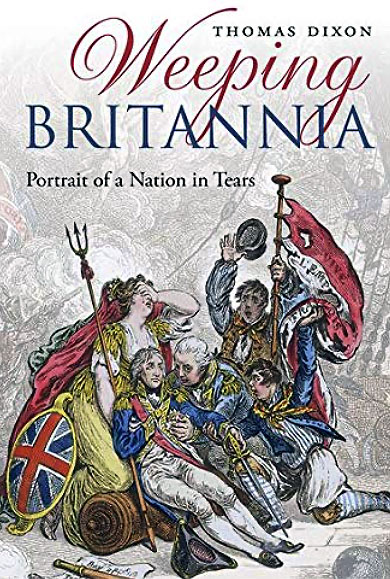
In 1955, commercial television stations started to broadcast in the UK for the first time, and to compete with the BBC who had previously held a monopoly on the medium. From the earliest days there were fears, substantially justified as it turned out, that this development would lead to a race by broadcasters to secure the highest audiences by airing the most sensationalist programmes, often modelled on American formats.
Even in the 1950s, long before the age of Oprah Winfrey, American culture had a reputation for greater emotionality, which was reflected in its television programmes. The Daily Mirror reported that American medical men had 'gone on record as saying a sob is essential to our mental well-being! They say we men should weep at least once every three weeks - and if we do not exercise our tear ducts we'll upset our glands!' In 1953, in the Daily Express, Eve Perrick wrote about the most popular programme on American television at the time, a new 'weepie' format called This Is Your Life. Perrick explained that the formula involved a notable person being surprised by the host, who then took his 'victim' to a studio where assorted friends and family, an aged mother, or an estranged daughter were sprung on him to review his life. The result; 'He weeps, she weeps, we weep, they all weep. And the show is a riotous success.' This Is Your Life was imported and broadcast on British television by the BBC from 1955. The first episode featured the host of the American version of the show, Ralph Edwards, surprising the Irish broadcaster Eamonn Andrews, who then became the regular host of the programme, which proved a great ratings hit for the BBC.
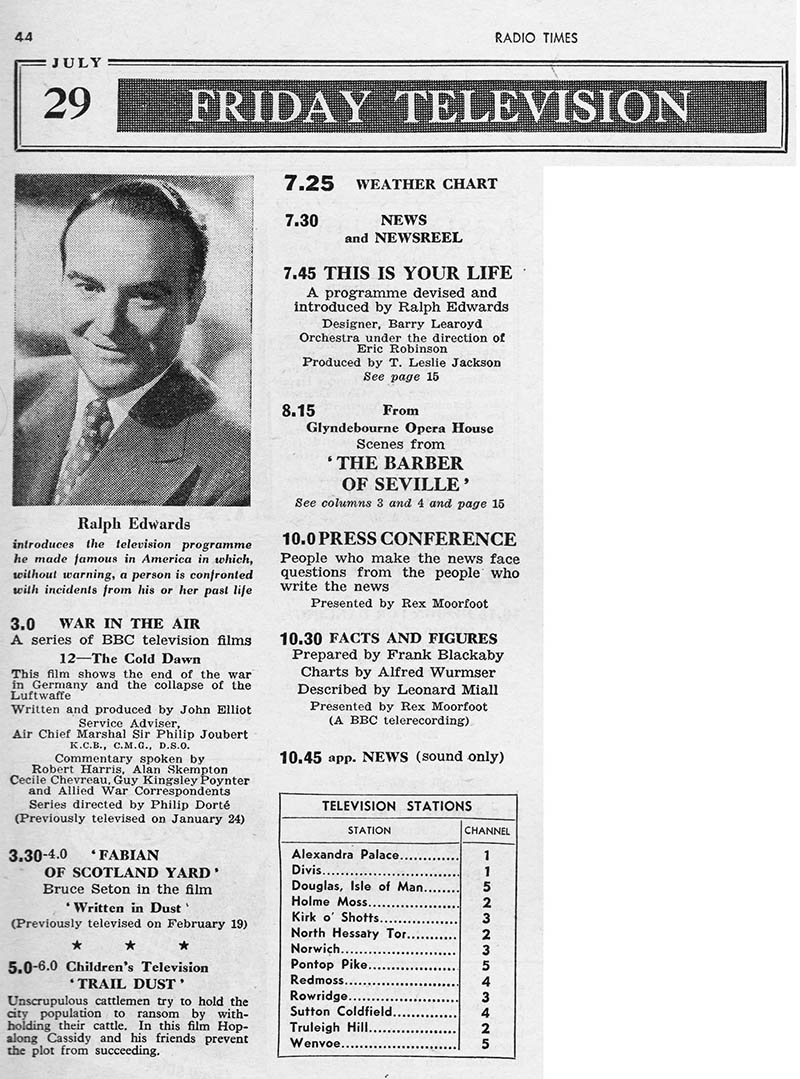
Radio Times 22 July 1955
A programme devised and introduced by Ralph Edwards
Designer, Barry Learoyd
Orchestra under the direction of Eric Robinson
Produced by T Leslie Jackson
Ralph Edwards introduces the television programme he made famous in America in which, without warning, a person is confronted with incidents from his or her past life
Series 1 subjects
Eamonn Andrews | Yvonne Bailey | Ted Ray | James Butterworth | C B Fry | Johanna Harris | Donald Campbell | Joe BrannellyStanley Matthews | Henry Starling | Ida Cook | Lupino Lane | Hugh Oloff de Wet | Elizabeth Wilde | Robert Stanford Tuck